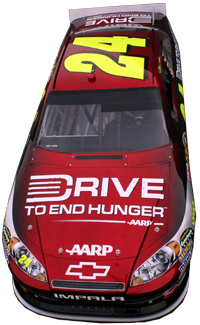All too often these days corporate social responsibility is seen as a given, but in then given little thought when it comes to execution. This may be a huge missed opportunity for companies. According to researchers in Singapore, customers care about the "fit" of a company and their CSR.
 Take for example AARP's "Drive to End Hunger" Campaign. According to their website, AARP is a nonprofit, nonpartisan organization with a membership that helps people age 50 and over have independence, choice and control in ways that are beneficial and affordable to them and society as a whole. The general public perception of AARP is that it is an organization for old people. In the fall of 2010, AARP partnered with Jeff Gordon and NASCAR on a program called the Drive to End Hunger. This was the first time for a cause-based organization to fully sponsor NASCAR. Jeff Gordon is a very philanthropically involved figure, so he was a logical face for the program. Unfortunately, the cause of hunger doesn't automatically trigger the thought of old people. As a society, we have been programmed to picture emaciated African children with gaunt bellies instead of elderly Americans. While unfortunately there are certainly hungry people over the age of 50, hunger and old age are not a clear "fit".
Take for example AARP's "Drive to End Hunger" Campaign. According to their website, AARP is a nonprofit, nonpartisan organization with a membership that helps people age 50 and over have independence, choice and control in ways that are beneficial and affordable to them and society as a whole. The general public perception of AARP is that it is an organization for old people. In the fall of 2010, AARP partnered with Jeff Gordon and NASCAR on a program called the Drive to End Hunger. This was the first time for a cause-based organization to fully sponsor NASCAR. Jeff Gordon is a very philanthropically involved figure, so he was a logical face for the program. Unfortunately, the cause of hunger doesn't automatically trigger the thought of old people. As a society, we have been programmed to picture emaciated African children with gaunt bellies instead of elderly Americans. While unfortunately there are certainly hungry people over the age of 50, hunger and old age are not a clear "fit".
There were many causes and CSR focuses that AARP could have chosen to create a program around. The rationale behind this choice is unclear. A better choice would have been Alzheimer's or even generally healthy aging.
But how important is this “fit” to customers? Do customers care about a company’s reputation and what they are doing in the way of social responsibility? How do these perceptions influence buying decisions?
Recently McDonald's announced that they were going to stop sourcing their pork from suppliers that used inhumane practices in raising their pigs. This is a choice that will please animal rights groups concerned with the treatment of animals raised for slaughter. But does it matter? Some think not - they key being availability of substitutes. This idea makes logical sense. If you can only get the product from one company then you are less likely to let your opinions on their CSR change your behavior. However if you can go down the street and get a similar sandwich that is sourced responsibly the choice is easy. It seems that consumers want to do the right thing, but only if it is convenient.
So how do these ideas come together? I am interested in exploring how a company's corporate social responsibility decisions impact their customer's loyalty and buying decisions.

Hi Kate - First, the blog post itself is way short. I'm hoping you'll try to write more on the next one (at least twice as much, I would say). As for the topic, I think it is very interesting. I happen to know the guy who used to be at GSD&M and worked on this AARP-NASCAR thing. As I remember, he was never on board with it either. Let me know if you would like to try to talk to him - he is at Dell now. I am betting that there is a lot written on this topic. Do you plan to also conduct primary research or just stick with secondary? Secondary is probably fine on this. You may also look into work by Minette Drumwright, who is in the Communications school here at UT. I think this is close to if not right on her area of interest. Let me know if you want to chat along the way.
ReplyDelete